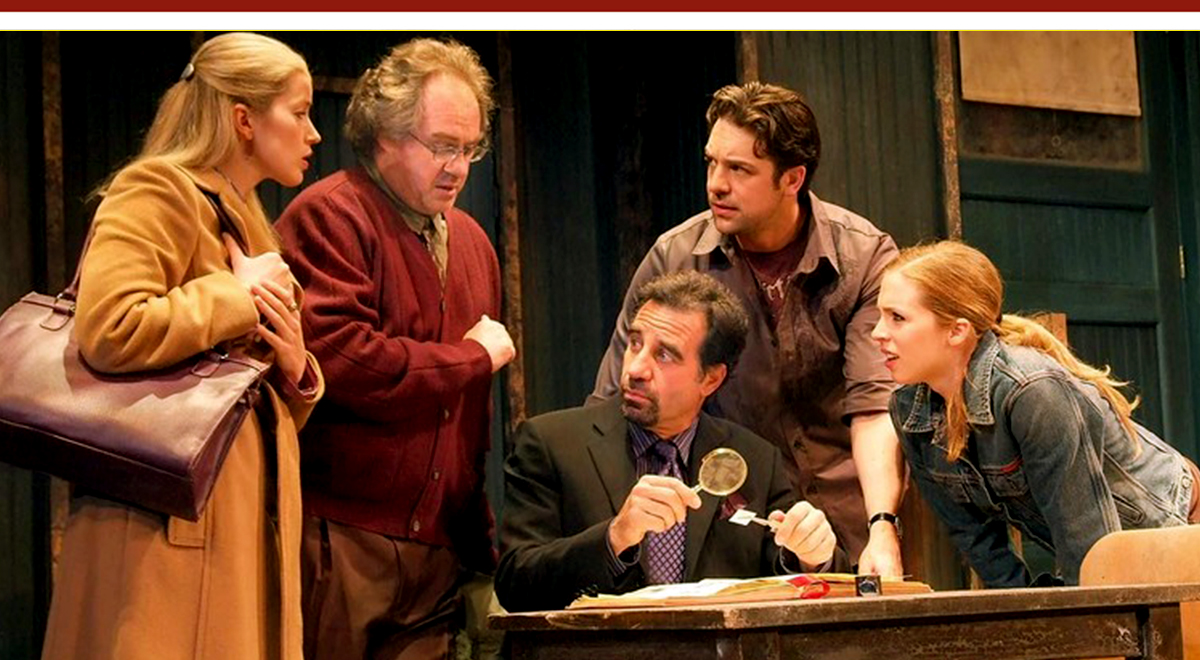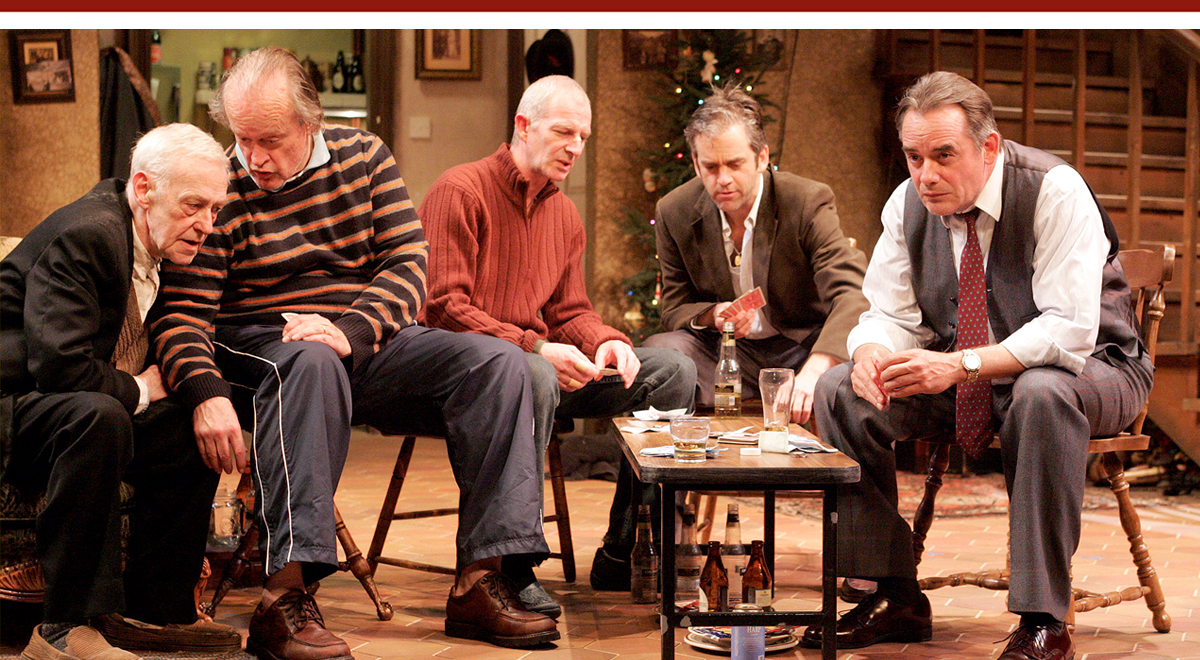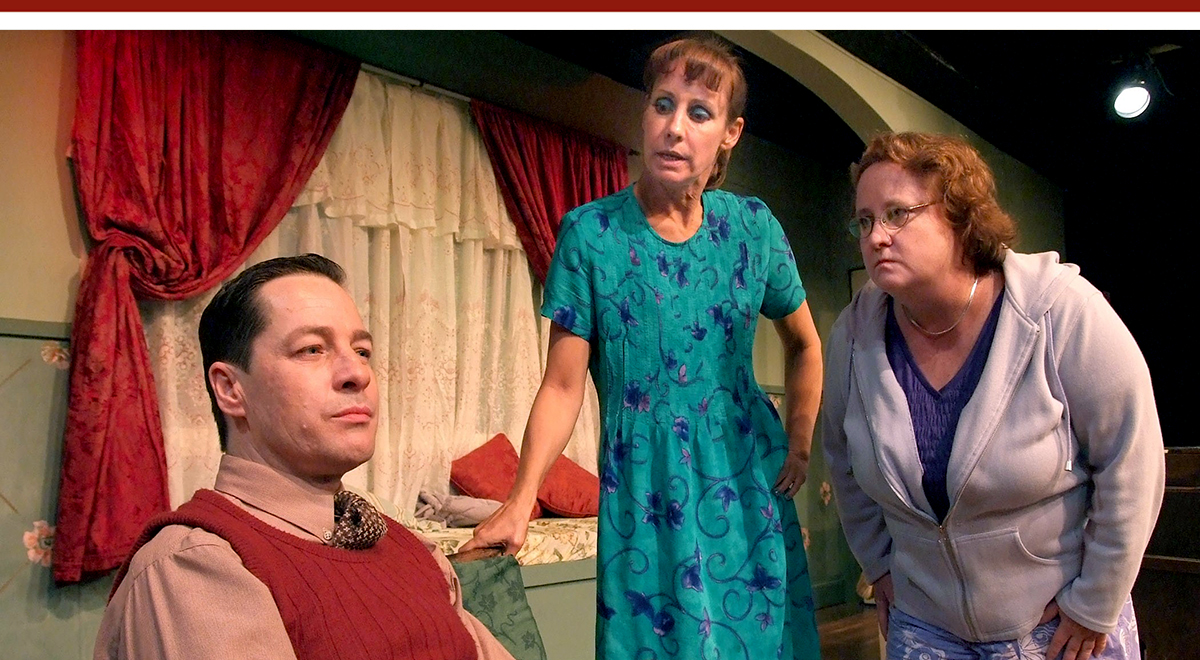APRIL 2009
Click title to jump to review
LYDIA by Octavio Solis | Mark Taper Forum
MAURITIUS by Teresa Rebeck | Pasadena Playhouse
OUR MOTHER'S BRIEF AFFAIR by Richard Greenberg | South Coast Repertory
THE SEAFARER by Conor McPherson | Geffen Playhouse
VOICE LESSONS by Justin Tanner | Zephyr Theatre
Brujaja
Playwright Octavio Solis and Director Juliette Carrillo have crammed enough domestic and mythic drama into Lydia, which opened at the Mark Taper Forum Wednesday, to turn the onstage single-family residence into a Pandora’s box and the Taper house into a pressure cooker. There’s so much here, in fact, that if audiences hang in, they are likely to experience a powder keg with more dimensions than can be observed in a single viewing (through May 17). Fortunately, the opening night crowd held on and was rewarded.
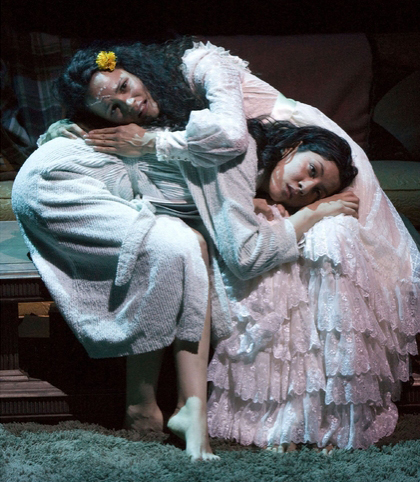
The dense, three-hour drama is an ambitious stew of street-level realism enfused with symbolism, straight-talk embellished with poetics, and solid acting lead by Stephanie Beatriz in the title role. It may leave a viewer with the impression of cubist art: having simultaneously seen every facet of an issue despite looking from a single perspective. Solis has given his huge canvas a tight narrative weave. Nothing feels extraneous while watching. However, there is a sense that trimming the exchanges overall of as much as 30 minutes would tighten the rhythm even more, and make the impact more explosive.
Tragedy has struck the house of Flores and the five members’ responses are internalized in different ways. Claudio (Daniel Zacapa) moves angrily between his odd-hours job and an easy chair cocoon fortified with cerveza and stereo headphones. His withdrawal is balanced by wife Rosa’s (Catalina Maynard) chirpy confidence that nothing happens without her knowing it. As the play begins she is beginning a new job that, after two years as caretaker to her injured daughter, will bring in a second income and a hired housekeeper from Jalesco. Older son Rene’s (Tony Sancho) repressed emotions are coming out in sociopathic rages against gays, while younger son Miguel, or Misha (Carlo Albán), is immersing himself in his poetry.
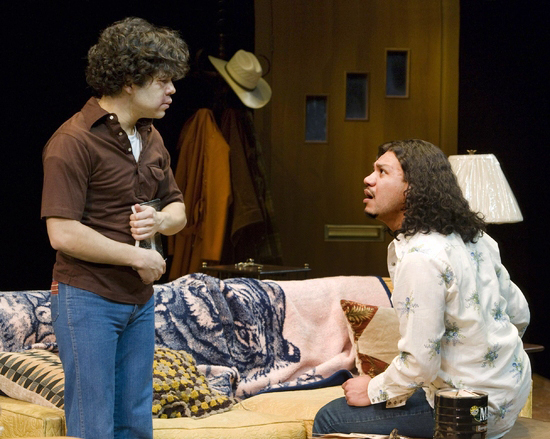
Taking us into this world, as if working us through a secret tunnel into a goldfish bowl in the living room, is Cecilia, or Ceci (Onahoua Rodriguez). She welcomes the audience at houselights out, setting the stylistic tone – poetic, mystical, dreamlike -- as she shares the shards of her story. Her expansive, celebratory preface about flying and becoming, ends as she squeezes us into the confines of her glass globe. A horrendous automobile accident has left her neurologically damaged, writhing and moaning like a metamorphosed Kalfa character on the mattress in a corner of the living room. Despite being muted, she remains central to the story, with her vivid inner world coming to us in observations and forgiveness delivered in break-out soliloquies.
Arriving to free Rosa for her new job is Lydia, an illegal whose own tragedy left her an orphan. Her near-death experience left her a heightened appreciation of life and antipathy for bullshit, which plays out in a mystical connection to Ceci’s “life within my life.” She not only becomes an oracle for the broken Flores, but a firm sounding board against which the others’ self-pitying and self-deceptions are corrected and thrown back at them.
It’s wrong to have to measure every ambitious American family drama against Miller’s mid-20th Century monument, Death of a Salesman. But one can find that story’s template in the foundation under Lydia. Here, the troubled boys and parents recall the Loman quartet, with the older Rene mysteriously stunted by the secrets that drive the play; a father beaten down by alienation; and a mother in danger of being pulled under by his anchor. Upon this footprint Solis adds a daughter to absorb their sins and pay their wages for what Claudio calls their “penance.”
The big secret involves the night of the accident, and the truth will out, coaxed in great part by the no-nonsense Lydia. It will involve a sixth character, cousin Alvaro (Max Arciniega), a Marine back from Vietnam who joins the INS to enforce border transgressions. Alvaro is the catalyst, embodying the duality of life on the border of acceptance and alienation, and stirring the loves that have dared not speak their names. This will drive towards a finality of reuniting the physical and spiritual in an overpowering correction of sexuality denied. It will be Lydia’s gift as Ceci’s inner flame finally consumes her in the show’s, and her, climactic moments.
Christopher Acebo’s set is properly drab, but a play this textured would benefit from use of an upstage wall with, if not projections, at least lighting shifts on scim. With the excellent Christopher Akerlind on task, there could be some valuable accenting added. Christal Weatherly has done well with the ‘70s clothing, finding the border between current fads and Western wear.
The integration of Spanish words and phrases into the predominately English script is a theatrical bonus for the bilingual. Solis has mastered the trick of slyly providing translation of the Spanish within context or English echoing, as evident in his perennial holiday play, La Posada Magica. (Coincidentally, after more than a decade housed at commissioning South Coast Repertory, that story of Mary and Joseph’s Christmas Eve search for lodging will itself seek new lodging.) With Lydia, however, English-only patrons will want to study the program’s glossary page before the show. This is one to prepare for, and savor.
top of page
LYDIA
by OCTAVIO SOLIS
directed by JULIETTE CARRILLO
MARK TAPER FORUM
April 2-May 17, 2009
(Opened, reviewed April 15)
CAST Carlo Alban, Max Arciniega, Stephanie Beatriz, Catalina Maynard, Onahoua Rodriguez, Tony Sancho, Daniel Zacapa and (u/s) Alejandra Flores, Francisco Garcia, Ruben Garfias, Isabelle Ortega
PRODUCTION Christopher Acebo, set; Christal Weatherly, costumes; Christopher Akerlind, lights; David Molina, sound/additional music/arrangements; Chris Webb, music; Rick Sordelet/Greg Derelian, fight choreography; Carol F. Doran, wigs/hair; Natsuko Ohama, vocal coach; Michelle Blair/Joe Witt, stage management
HISTORY Commissioned, developed, premiered at Denver Center Theatre
Onahoua Rodriguez and Stephanie Beatriz, top; Carlo Alban and Tony Sanchez
Craig Schwartz
Don't look behind you
Theresa Rebeck’s Mauritius is the prolific 20-year veteran’s first play on Broadway and second on TCG’s annual list of the ten most-produced scripts in regional theater. Jessica Kubzansky’s staging for Pasadena Playhouse (through April 26) helps explain the popularity. It’s a rare collection of solid suspense plotting, character conflict and provocative themes.
However, there’s some additional mystery in what might further be missing from the production’s impact, as actors occasionally fail to sound the deeper resonances Rebeck’s scenes offer. This results in a few scenes, perhaps unnecessarily, feeling overdrawn. Nevertheless, Kubzansky gives Rebeck’s plot-driven vehicle the forward motion the playwright is after.
The dramatic subtext woven into the girl vs. grifters structure is how clinging to “victimhood” from past wrongs retards us. And yet, for the most part, Kubzansky’s actors skim it in service of the story.
Rebeck, who often cites August Wilson’s The Piano Lesson as an example of plays successfully built on high-stakes yet balanced conflict, has taken a page from that plot: siblings battling over the future of a valuable inheritance. To that she has added a lambs-outfoxing-the-lions twist. It doesn’t hurt our rooting interests that the lambs are half-sisters and the lions conmen. The gender politics, especially on Tom Buderwitz’s wonderfully worn turntable set, help evoke an echo of Mamet’s American Buffalo soldiers.
The pace of the show begins carefully, as central character Jackie (Kirsten Kollender) arrives in Philip’s (John Billingsley) stamp shop seeking an appraisal of her collection. Hidden behind a newspaper sits Dennis (Chris L. McKenna), a handsome ne’er-do-well who will come to Jackie’s aid when the shop owner brushers her off. As important as the plot turn is that links Jackie and Dennis, is the one establishing the theme of cutting loose past grievances. Phil, full of resentment of years of amateurs asking for a favor, is about to miss philately’s version of the lottery.
Instead, because he is less jaded (or perhaps more desperate), the younger Dennis will stand to benefit. Soon, we discover that Jackie’s collection may not be hers to sell. Her half-sister Mary (Monette Magrath) has recently returned home after the death of their common parent. Like Walter Franz in Arthur Miller’s The Price, another play built on siblings wrestling over recently acquired inheritance, Mary did not care for their mother. But Rebeck keeps the album’s ownership murky, never telling us whether the stamp-collecting “grandfather” was maternal and shared, or paternal and only related to one.
All the characters may in fact be more interesting than we see here. Not for lack of effort, Magrath’s Mary remains opaque. Sterling (Ray Abruzzo), the millionaire buyer with a gangster lean, is a potential tour de force. In Sterling’s three big scenes one imagines an Andy Garcia or the late Ron Silver exposing the kid inside the killer, a duality both tyrannical and tender that should be driving him throughout the show. As a result, Abruzzo’s and Magrath’s scenes seem to run out of material before the end. Billingsley, other than a bit of over-the-top, Gollum-gets-the-ring hysteria near the end of the show, gives philatelist Phil the proper tone.
It is Kollender’s and McKenna’s show, however, and they make it a pleasure throughout. Kollender falls a little short of the demands of the high-voltage emotion in the scene that takes us into the break. Otherwise, she is a joy to watch. McKenna is a treat, balancing Dennis between con man and confidence builder, and allowing the end to work its magic.
Kudos to Kubzansky for giving Rebeck’s ground-breaker a great stand in Los Angeles, and the Pasadena Playhouse as good a non-musical as it has mounted since “Cuttin’ Up.”
top of page
MAURITIUS
by THERESA REBECK
directed by JESSICA KUBZANSKY
PASADENA PLAYHOUSE
March 27-April 26, 2009
(Opened 4/3, Reviewed April 4 mat)
CAST Ray Abruzzo, John Billingsley, Kirsten Kollender, Monette Magrath, Chris L. McKenna
PRODUCTION Tom Buderwitz, set; Maggie Morgan, costumes; Jaymi Lee Smith, lights; John Zalewski, music/sound; Jill Gold/Hethyr Verhoef, stage management
Monette Magrath, John Billingsley, Ray Abruzzo, Chris L. McKenna, and Kirsten Kollender
Craig Schwartz
Contested recall
In Our Mother’s Brief Affair, currently receiving its world premiere at the commissioning South Coast Repertory (through May 3), Richard Greenberg has again found his play’s material and mechanics in memory. Driven by the inquiry of the incomplete children of mysterious parents, Affair recalls the generational fluidity of his masterpiece, Three Days of Rain, and the actual characters of his lesser Everett Beekin. It is his richest, most interesting play in several outings.

It’s fair to begin looking at Affair with what first meets the eye. Scenic designer Sibyl Wickersheimer again takes chances as she did in SCR’s Night Music. And, again she succeeds in adding substantially to the production’s gestalt, making the set an emotional element without pulling focus from the players. Towering brick walls of Greenberg’s beloved ecru rise around the urban park, rusting at the top as they reach for the flies. They are arranged around the playground “monkey bars” and various benches as if to help twins Seth (Arye Gross) and Abby (Marin Hinkle) corner the squirrelly memories their aged mother, Anna (Jenny O’Hara), lets loose over the series of visits that make up the 100-minute one-act.
The superior success of Our Mother’s Brief Affair, however, owes much to the sensitivity of director Pam MacKinnon and the fine performances of a quartet of great stage actors.
Greenberg builds his narrative out of carefully jumbled pieces of recall. Seth and Abby sort through what they remember from their visits so that we first see Anna retelling the events and then reliving them as her children watch them occur as we do. Anna’s final days will be increasingly foggy, and the gray areas of her memory will grow more suspect. But Greenberg will not only empathize with that condition, he will employ it to further his mystery in what becomes an endearing tribute to the family member whose intellect is often underestimated.
Anna’s story is about a man (Matthew Arkin) she met, first accidentally and then through “assignation” (one of those unfortunate word choices, like ecru, that Greenberg cannot resist, and which catch in our ear canals like gall stones). He is, of course, everything her husband has ceased to be: most importantly, a sensitive, passionate listener. They will share secrets during an affair measured in weeks. And his secret, about his identity, will trigger the first “jagged turn in the evening,” as Seth describes it. This sends us off on another of Greenberg’s indulgences: a perhaps too-thorough recounting of an historical event. But this is excusable as it makes the playwright’s larger point. The event, once seen as an unforgettable transgression in the mythology of the American left, has lost its immediacy. So, Seth tells the story. It may be tangential to the rest of the play, but it is a justifiable detour that asks us to shift our focus to collective, national memory. We see America as Anna, forgetting too easily, fabricating too wantonly, and hiding pieces of understanding from the children we expect to take the reins.
Not only has Greenberg made a motif of testing his characters’ memories, he happily tests his audience’s. We met Anna, and her sisters Sophie and Miri in Everett Beekin, and followed Anna’s two children (in that case, sisters) as one moved to Orange County.
For her part, MacKinnon first cast the show perfectly and then gave her actors a wonderful pace and environment with which to work. They often linger on the benches after a scene, reading a paper or napping before their next scenes, creating an appealing sense of spontaneity and independence. All are excellent and, predictably, Hinkle’s performance has not an eyelash out of place. But in Gross, she gives the play a center that is so sensitive that we imagine it a stand-in for the writer. There is something particularly right about how Gross deals with O’Hara’s Anna. It’s a window into a lived-in relationship. We see it in all its complexity, sweetness and angst. Seth has been built with calm, understanding and love. And that becomes one of the memories audiences will take away from this enjoyable and enriching production.
top of page
OUR MOTHER'S BRIEF AFFAIR
by RICHARD GREENBERG
directed by PAM MACKINNON
SOUTH COAST REPERTORY
March 15-April 5, 2009
(Opened 3/20, rev'd 3/21m)
CAST Matthew Arkin, Arye Gross, Marin Hinkle, Jenny O’Hara
PRODUCTION Sybil Wickersheimer, set; Rachel Myers, costumes; Lap-Chi Chu, lights; Michael K. Hooker, sound; John Glore, dramaturg; Kathryn Davies/Chrissy Church, stage management.
HISTORY World Premiere. Commissioned by South Coast Repertory
Matthew Arkin, Jenny O'Hara, Marin Hinkle and Arye Gross
Henry DiRocco
The ancient marinators
Like a storm at sea, Conor McPherson’s tale of lost souls rises out of a placid, if choppy, surface to shake our very faith in providence. Once The Seafarer passes, the views are clearer and our focus even sharper. At The Geffen (through May 24), Artistic Director Randall Arney and his cast have done justice to McPherson’s play, with a bleak, womanless world that floats on alcohol and chance.
With furnishings that would curb the enthusiasm of Goodwill drivers (Takeshi Kata designed the set), brothers Richard (John Mahoney) and Sharky (Andrew Connolly) are sharing a dingy home in Ireland. Their main room is below ground level, roughly six feet under.
The play begins on the morning of Christmas Eve as Richard and his friend Ivan (Paul V. O’Connor) shake off the fog of the previous night’s drinking. They soon head off to stockpile more food and drink in order to properly celebrate the holy day and entertain any visitors who stumble down their stairs.The one friend who shows up is Nicky (Matt Roth), in the company of a stranger named Mr. Lockhart (Tom Irwin). Lockhart has been tailing Nicky on his rounds of bars and friends’ homes. We soon learn that Lockhart’s bar-hopping has been a search for Sharky. There is an old score - from 25 years ago exactly – that needs settling.
Like the religion The Seafarer draws upon, the devil is in the details of McPherson’s play. Lockhart is a character with supernatural power who has a habit of inserting himself into man’s system of justice and retribution. After he “rescues” a murder suspect from incarceration, he makes his Faustian deal. However, just to be fair, he offers to let the human, now teetering at the edge of damnation, go scot free if he can beat him at cards. Arney’s cast adds nice variety to this evenly drawn ensemble piece. Connolly is superb, as is Irwin. Their sparring is marvelous.
After a perplexing opening section, in which he goes for minutes on end without varying continuous-tone screaming, Mahoney settles in. Perhaps, too, McPherson has crammed too many conflicting traits into Richard (like caring and uncaring, mean and friendly, etc.) for anyone to tuck in all the corners. Connor and Roth round out the cast with fine work.
McPherson has written a play that waits to tip its hand to the larger issues, then raises the stakes for all they are worth, ending the two-act, two-hour show by rising above them. We leave the world of “The Seafarer” with a sense of empowerment: perhaps the fates are on our side after all. Perhaps such things as man-made music and the attentions of a woman will trump the heavy-handed machinations of the otherworldly. If that isn’t enough, McPherson has given his ‘Seafarer’ an ending that would catch even O Henry off guard. It should have you smiling for days.
top of page
THE SEAFARER
by CONOR McPHERSON
directed by RANDALL ARNEY
GEFFEN PLAYHOUSE
April 14-May 24, 2009
(Opened 4/22, reviewed 4/23)
CAST Andrew Connolly, John Mahoney, Paul Vincent O’Connor, Matt Roth, Tom Irwin (u/s – James Horan, Bob McCracken, Marty Lodge)
Paul Vincent O’Connor / Lamont
PRODUCTION Takeshi Kata, set; Janice Pytel, costumes; Daniel Ionazzi, lights; Richard Woodbury, sound; James T. McDermott/Jennifer Brienen, stage management
John Mahoney, Paul Vincent O’Connor, Andrew Connolly, Matt Roth and Tom Irwin
Michael Lamont
Sang Freud
The words “Laurie Metcalf” on a theater flyer should sell out a run before critics can add their inevitable raving. In a house as intimate as the Zephyr Theatre, where she and French Stewart are co-starring in the world premiere of Justin Tanner’s Voice Lessons (through May 17), tickets will go even faster. Especially when word gets out that Metcalf starts the raving herself with an onstage clinic on how the disciplined actor creates a character who is completely unhinged.
Tanner is a local favorite and beloved by his faithful actors for plays including Pot Mom, Barbie and Ken at Home, Coyote Woman, Intervention, and Oklahomo. Sadly, the “play” here is but a trifle. It’s really a one-act, clocking in at little more than an hour and little more than one joke: a socially graceless, talent-free woman in her 40s ropes a cash-strapped vocal coach into entertaining her demented dream of superstardom.
As deluded as she is devoid of talent, Ginny (Metcalf) approaches a song with the finesse a starving dog approaches fresh meat. After taking a tune in her jaws, she shakes it free of melody and tosses it out of reach. Immediately seeing more red flags than a Soviet parade, Nate (Stewart) realizes he needs out. Ginny arrives 20 minutes late for a half-hour session, refuses to warm up, and inserts seizure-victim choreography into her versions of show tunes. When he attempts to end the contract, she reminds him that she is prepaid -- at triple his usual rate -- and recalls all the unfortunate -- and largely untrue -- hardship she has experienced.
Under the direction of Bart DeLorenzo and the playwright, Metcalf creates a woman who is at once unbelievable and vaguely recognizable. As the suffering instructor, the versatile Stewart serves as stoic straight man, gamely fanning Ginny’s outbursts. In scene one, the chemistry and solid comedy writing lift expectations that we are onto something extraordinary. However, the arc soon plateaus, and we’re onto the flatlands. Funny -- occasionally hysterically so -- but flat. From here, Tanner will milk his joke, wringing plenty of laughs, and opening the plot up with a third character. Ginny (and the audience) discover that, all along, Sheryl (Maile Flanagan) has been living with Nate as lover and lender, helping him pay his rent. The women cat-fight over the coach before they both abandon him and bring the play to its end – not so much reaching a conclusion as running the joke into the ground.
Ultimately Voice Lessons is more a showcase for the depth of Metcalf’s and Stewart’s talents than Tanner’s playwriting, which -- here, at least -- is more playfulness than play. Tanner has a breezy knack for set-up and delivery of character-based jokes, but Voice Lessons is no more than Cable Network sketch comedy. With this level of actors it’s an imbalance on the order of the “Seinfeld” cast telling a Henny Youngman one-liner. Still, the actors’ telling is likely to be the stuff of annual critic awards. However, if Tanner’s writing gets a nod, that also would be telling.
Kudos to the production design team of Gary Guidinger (set and lights) and Kristian Hoffman (sound). Because there is no costume designer, we assume the clothes were strictly BYO, which means Ms. Metcalf’s crazy couture gives painful new meaning to coming out of the closet.
top of page
VOICE LESSONS
by JUSTIN TANNER
directed by BART DeLORENZO
and JUSTIN TANNER
ZEPHYR THEATRE
April 10-May 17, 2009
(Opened, reviewed 4/10)
CAST Maile Flanagan, Laurie Metcalf, French Stewart
PRODUCTION Gary Guidinger, set/lights; Kristian Hoffman, sound; Deborah Taylor, Linda Toliver, Gary Guidinger, producers


